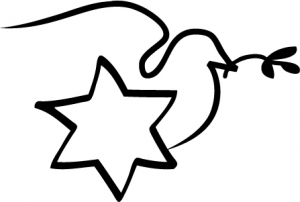Yad Vashem Official on the Rescue of Jews by French Monasteries during the Holocaust
The Yom HaShoah (Holocaust Memorial Day) commemorations will begin on Wednesday, April 11 at 7 p.m. with a public lecture by Eliot Nidam, the Head of the Academic Affairs Section of the International Institute for Holocaust Research at Yad Vashem, Jerusalem. Nidam's lecture entitled "Living with the Other: Religious Congregations in France and the Hiding of Jews During the Holocaust" will take place in Room 201 AB, the Blue Ridge Ballroom at the Plemmons Student Union on the campus of Appalachian State University.
During the Holocaust, some Jews were helped by members of various religious congregations in France. Some opened the doors of their convents and institutions and others helped by placing Jews in private homes, providing false identification or food ration cards and assisting them to illegally cross the border. This lecture will open up the discussion of the religious as rescuers by trying to understand the ecclesial and congregational aspects as well as the relational context in which these actions took place.
Yom HaShoah is Thursday, April 12 and the Center for Judaic, Holocaust and Peace Studies along with Appalachian State's Hillel chapter and the Temple of the High Country will present a public reading of the names of European Jews murdered by the Germans and their allies during the Holocaust. This reading is scheduled to take place from 10 a.m. until 6 p.m. in the outdoor space between Appalachian's Belk Library and Information Commons and the University's Bookstore in Plemmons Student Union (in the event of rain, the event will take place in the entry foyer of the Belk Library).
Students, faculty, staff, members of the Temple and the community at large are invited to sign up for one of the ten-minute reading slots for participation. To sign up for a reading spot, visit this google document and add your name to the calendar.
After the readings, participants, campus and community members are invited to walk together in silence to the Temple of the High Country, located at 1043 West King Street, where a ceremony that encompasses the lighting of candles and the saying of the mourner's Kaddish will conclude the day's events. This ceremony starts at 6:30 p.m.
The United States Congress established the Days of Remembrance in 1980 as the nation's annual commemoration of the Holocaust. This genocide was the state-directed, systematic destruction of six million European Jews and millions of others, ranging from homosexuals and Soviet POWs to Roma and people with real and imagined disabilities by the Germans and their collaborators between 1933 and 1945.
Since 1982, the United States Holocaust Memorial Museum, created by Congress as a permanent living memorial to this genocide's victims, has organized and led the national Days of Remembrance ceremony in the U.S. Capitol Rotunda. Year after year, the museum staff marks this event together with Holocaust survivors, liberators, members of Congress, White House officials, the diplomatic corps and community leaders.
The recalling of the names of the deceased and murdered is not only an important part of Jewish religious traditions. It also serves as a practice for individuals of all backgrounds, faiths and cultures to commemorate victims. Much more than a devastating part of Jewish history, the Holocaust is truly an event in global history. The Holocaust's crimes of unimaginable cruelty offer opportunities to recommit to the need for respect for all people and to reflect on the moral responsibilities of individuals and communities today.
For more information on the public readings, please contact the Center at 828.262.2311 or email holocaust@appstate.edu. For the ceremony at the Temple, please email templeofthehighcountry@gmail.com or Hillel President Marisa Fernandez at fernandezme@appstate.edu. To sign up for a reading spot, visit this google document and add your name to the calendar.
###
About the Center for Judaic, Holocaust and Peace Studies
Appalachian State University's Center for Judaic, Holocaust, and Peace Studies was founded in 2002 to develop new educational opportunities for students, teachers, and the community. Located administratively within the College of Arts and Sciences, the Center seeks to strengthen tolerance, understanding, and remembrance by increasing the knowledge of Jewish culture and history, teaching the history and meaning of the Holocaust, and utilizing these experiences to explore peaceful avenues for human improvement and the prevention of further genocides.
The Center for Judaic, Holocaust, and Peace Studies is an associate institutional member of the Association of Jewish Studies, a member of the Association of Holocaust Organizations and of the North Carolina Consortium of Jewish Studies.
By Ellen Gwin Burnette and Thomas Pegelow Kaplan
April 5, 2018
BOONE, N.C.

